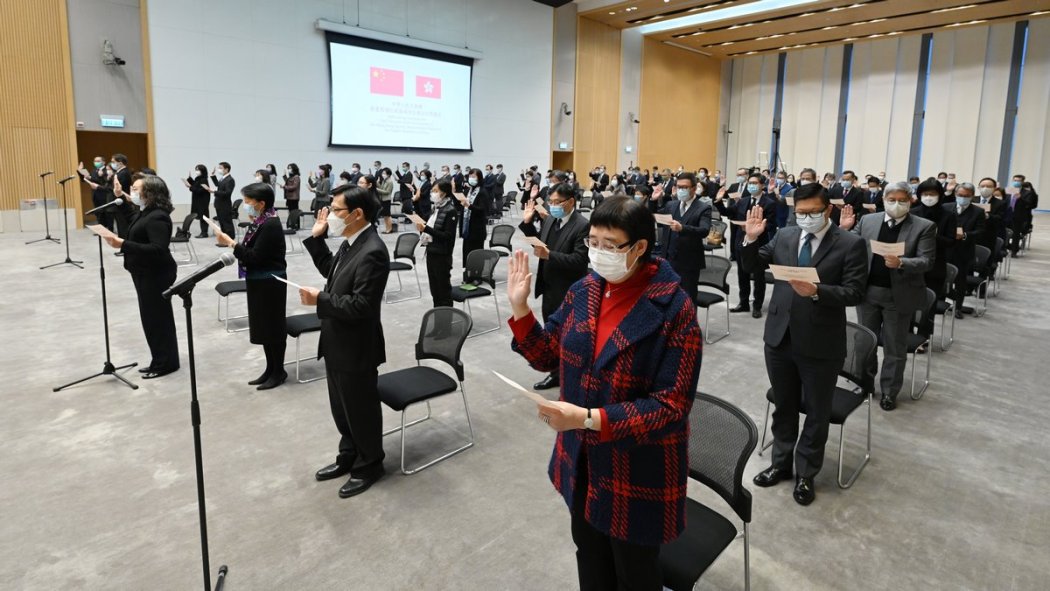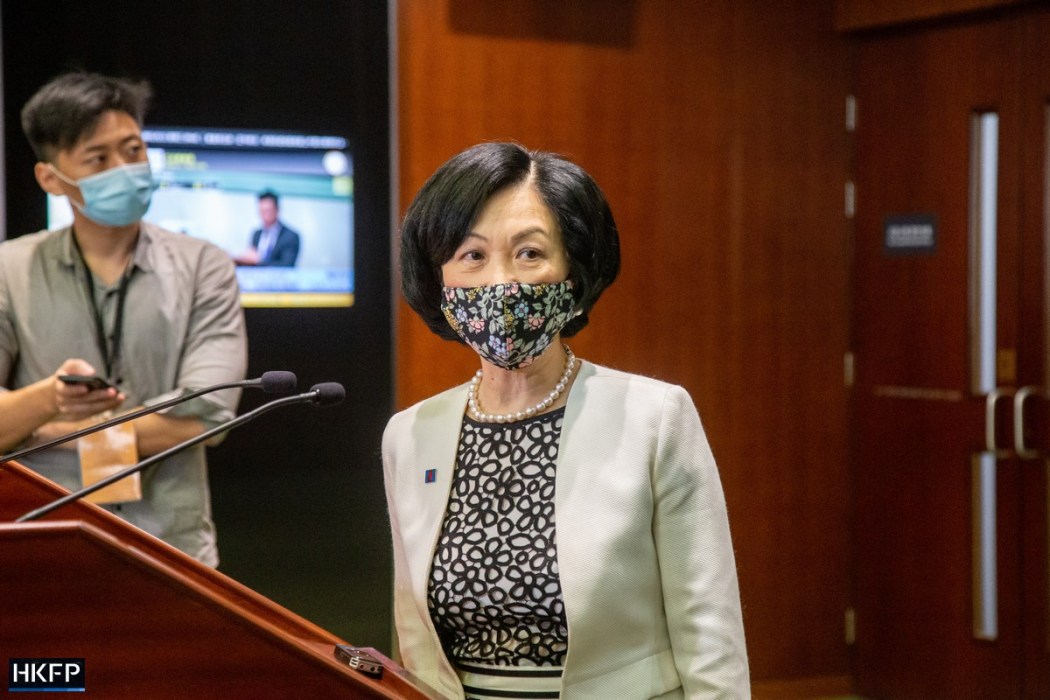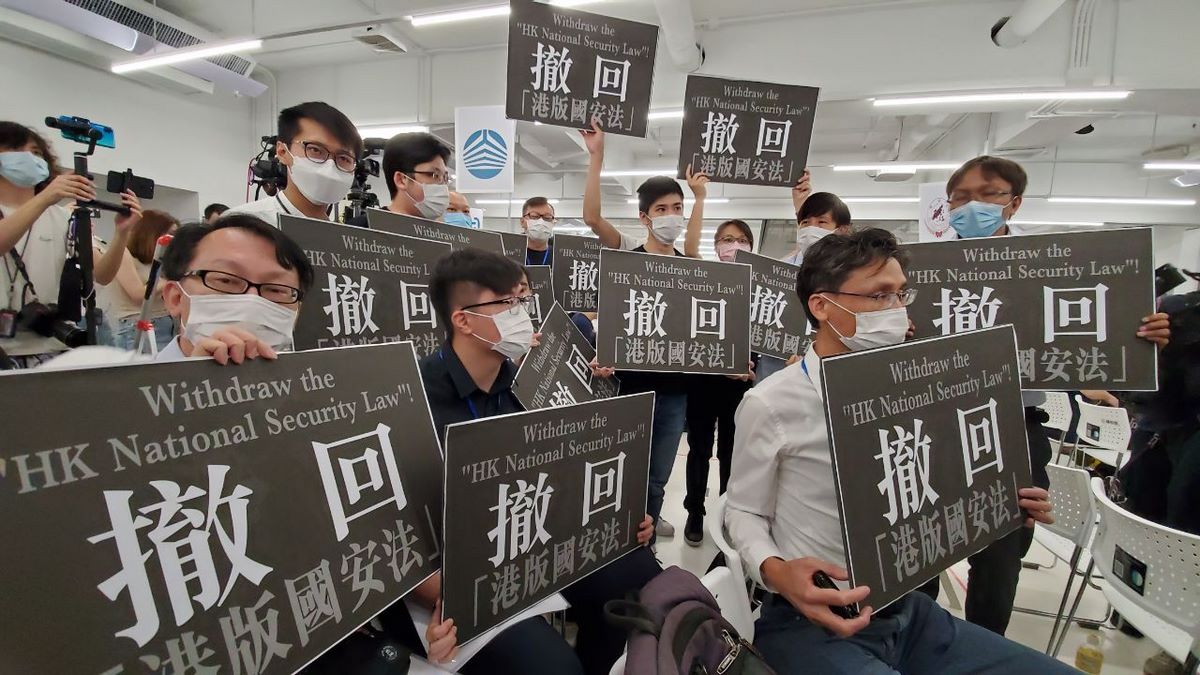Hong Kong lawmakers have approved an oath-taking bill that will require public officers, including district councillors, to pledge allegiance to the government and vow to uphold the Basic Law.
The bill was passed in the largely opposition-free Legislative Council (LegCo) on Wednesday by 40 votes for and one vote against. Under the amended legislation, members of the 18 district councils – predominately controlled by the pro-democracy camp – will be subject to a loyalty pledge that is already required for senior government officials, civil servants, lawmakers and judges.

Secretary for Constitutional and Mainland Affairs Erick Tsang said the passage of the bill meant four democrats – Fergus Leung, Lester Shum, Tat Cheng and Tiffany Yuen – will be unseated from the district councils after the amendments are gazetted next Friday.
Local media reported that Cheng and Leung submitted their resignations after they were detained for more than two months pending trial under the national security law. Shum and Yuen, on the other hand, already lost their seats after a court jailed them for six and four months, respectively, for knowingly taking part in a banned candlelight vigil last year to remember the 1989 Tiananmen Massacre.
During the second reading debate, Starry Lee, chairwoman of the pro-Beijing DAB party said she supported the bill and hit out at critics who said the new requirement for district councillors was a move to “suppress the opposition.”
She said that asking public officers to swear loyalty to the city and uphold the Basic Law was “the most basic requirement” and a “fundamental responsibility.” She added there was a “clear red line” that any public officer must not engage in behaviour that harms the principle of One Country, Two Systems.

“This is the red line that cannot be any clearer. If you know the red line exists, and still choose to step on it… then naturally you will need to bear legal consequences,” Lee said.
The DAB chair accused some district councillors of “politicising” the government advisory body and using the councils to “stir social conflict and spread hate.” She said the proposed legislation will put the district councils “back on the right track.”
Regina Ip of the New People’s Party also threw her weight behind the bill, saying it had “enriched” the definitions of pledging loyalty to the city. The amendments also showed Hong Kong adopts an executive-led system, she said, as the oath will be administered by the chief executive or someone appointed by the city’s leader.

“Passing this legislation will be beneficial to Hong Kong’s political and constitutional development in the long run,” she said.
Do’s and don’ts
The approved amendments included two lists which set out conduct deemed as complying with – or violating – the allegiance oath. Any public officer who commits acts endangering national security, refuses to recognise China’s sovereignty over Hong Kong, solicits interference by foreign governments or commits acts that undermine the “overall interests” of the HKSAR will be seen as breaching the vow.
Under the approved amendments, the secretary for justice may bring proceedings against a legislator or district councillor at any time during their term if he or she is suspected of contravening the oath.
The councillor concerned will be suspended until the court reaches a verdict. Those who decline to take the oath or violate the pledge will be disqualified and will be subject to a five-year election ban.

Cheng Chung-tai, one of the few non-pro-establishment legislators remaining after the pan-democratic camp quit en masse last November, was the only one who opposed the bill.
He criticised the draft law as giving sweeping powers to the justice minister to bring a case against council members, saying the subsequent suspension seemed to contradict the principle of presumption of innocence in common law jurisdictions.
“Our Rules of Procedure has a set of relevant requirements for disqualifying council members. The LegCo has its own mechanism… but in this amendment seems [to suggest] section 49B of the rules will be meaningless,” he said.
As of Tuesday, more than 20 pro-democracy district councillors have resigned for various reasons before the legislative amendments were approved. Some stated explicitly that they would not take the oath, while others cited health and personal reasons.

Among those who decided to quit were nine democrats that have been in custody since March pending trial over “subversion” charges under the national security law.
The oath-taking requirement was first unveiled on February 23, a day after a senior Chinese official said only “patriots” should hold power in the city. Beijing later steered an electoral overhaul for Hong Kong, which included reducing the ratio of directly-elected seats in the legislature and expelling district councillors from a committee that selects the chief executive.
Support HKFP | Policies & Ethics | Error/typo? | Contact Us | Newsletter | Transparency & Annual Report | Apps
Help safeguard press freedom & keep HKFP free for all readers by supporting our team
























